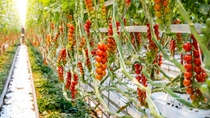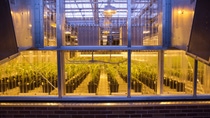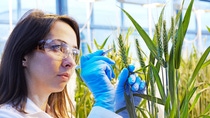Agriculture
Biologicals: Naturally Protecting Crops
Biological crop protection is an important step forward to further support sustainable agriculture. Biologicals help farmers meet society’s ever-growing demand for more sustainably grown food, while supporting and protecting plant health. Find out more!
What is Biological Control in agriculture?
Biological controls in agriculture are generally defined as crop protection and seed treatment products that are derived from living organisms. Examples include bacteria that protect against plant pathogens or beneficial nematodes that protect plants against insect pests. Biologicals can be complementary or alternative solutions to conventional crop protection products. Read on for more about biologicals for agriculture.
How can biologicals help farmers, society, and the planet?
Biological pest and disease control options allow growers to comply with changing regulations and standards for food production and manage chemical residues. They can even be applied prior to harvest, allowing growers greater flexibility regarding application time. Because of their different modes of action, biologicals can also be valuable tools for resistance management, which is critical for producing enough food globally in the face of pest pressures.
Does BASF produce biologicals in addition to its chemical and seed offerings?
Yes. BioSolutions by BASF are based on beneficial living organisms and nature-identical substances that can help improve crop protection management and support plants throughout their life cycle. BASF’s BioSolutions portfolio includes a number of biologicals products covering fungicides, insecticides, nematicides and inoculants. As demands on food quantity and quality increase, BASF’s role in agriculture is to help farmers grow healthy, high-quality food safely and protect the land that all of us hold in trust for future generations. To meet the challenges they face in the field, farmers should choose their techniques out of a full toolbox that includes chemical and biological crop protection, seed treatments, innovative seeds and traits as well as digital solutions. At BASF, we believe that there is space for both technologies: a good balance of both, conventional and biological, will help farmers to produce enough healthy food to feed a growing population while addressing societal expectations and consumer needs.

A good example of BASF’s BioSolutions portfolio is the biofungicide Serifel®. It’s a formulation based on living bacteria, Bacillus amyloliquefaciens strain MBI 600, that when applied provides broad-spectrum disease control and multiple modes of action for application in a broad range of crops and can easily be integrated into a program with BASF’s chemical fungicides. Listen to The Science Behind Your Salad podcast, starting at 27:00 of the Tomatoes episode for the BioSolutions segment on Serifel®.
What does the FAO say about Biological Pest Control?
In response to locust outbreaks in East Africa, the FAO writes “So biopesticides work best in holistic control strategies that are designed to prevent, rather than cure, large-scale outbreaks.” In describing the obstacles to wider use, the FAO says that biological pesticides “can’t replace conventional sprays”. “Many farmers are used to buying one chemical pesticide that they can use to kill multiple pests throughout the year,” says Alexandre Latchininsky, an FAO locust expert who specializes in control options. “With biopesticides, farmers need to buy different kinds of products to fight different pests, so it requires a change of habit. Additionally, biopesticides are more complicated to use, in terms of transportation, storage and mixing. All this actually requires more training than the use of the conventional pesticides. Both specialists and the general public should be well educated on this paradigm shift from curative to preventive means.”
BioSolutions by BASF
Biologicals are natural partners, but in nature they are not found at population sizes needed to control agricultural pests. The beneficial nematodes that are the basis for Nemasys C®, for example, were isolated right from codling moth larvae as its natural enemy. But like traditional chemical crop protection products, the volume of biological pesticides has to be increased to large-scale amounts that farmers could apply to protect their crops. “Our job is to get farmers these nematodes in higher quantities than found in nature, so that they can apply them when and where they have problems,” says Diana Londoño (see picture).
How BASF’s Biologicals Lead to More Sustainable Food Production
“There are many ways that we as consumers can reduce food waste, like lowering our expectations for perfect produce. But it’s also important to recognize the increasingly important role of agricultural innovation in minimizing food waste. That’s why we at BASF continue to research many different solutions for the worlds’ food producers, so that they have access to tools they need to make sure their produce ends up in nutritious meals and not as wasted resources. This includes research and development on options like biological pest control that can both protect crops from damage and fulfill the call to reduce pesticides.”
Interview Juergen Huff with Diana Londoño: How innovation can help to fight food waste
Watch “Natural Partners – BioSolutions by BASF” on YouTube
Natural partnerships – found everywhere in nature – are part of the answer. Between the old and the new, productivity and stewardship, agriculture and society. BioSolutions have a crucial role to play in this as natural partners for crops and for conventional crop protection. They’ll help us find the right balance for success – for farmers and growers, for agriculture and for future generations.
Learn More About Trends In Agriculture
Related topics
Last Update April 20, 2022


